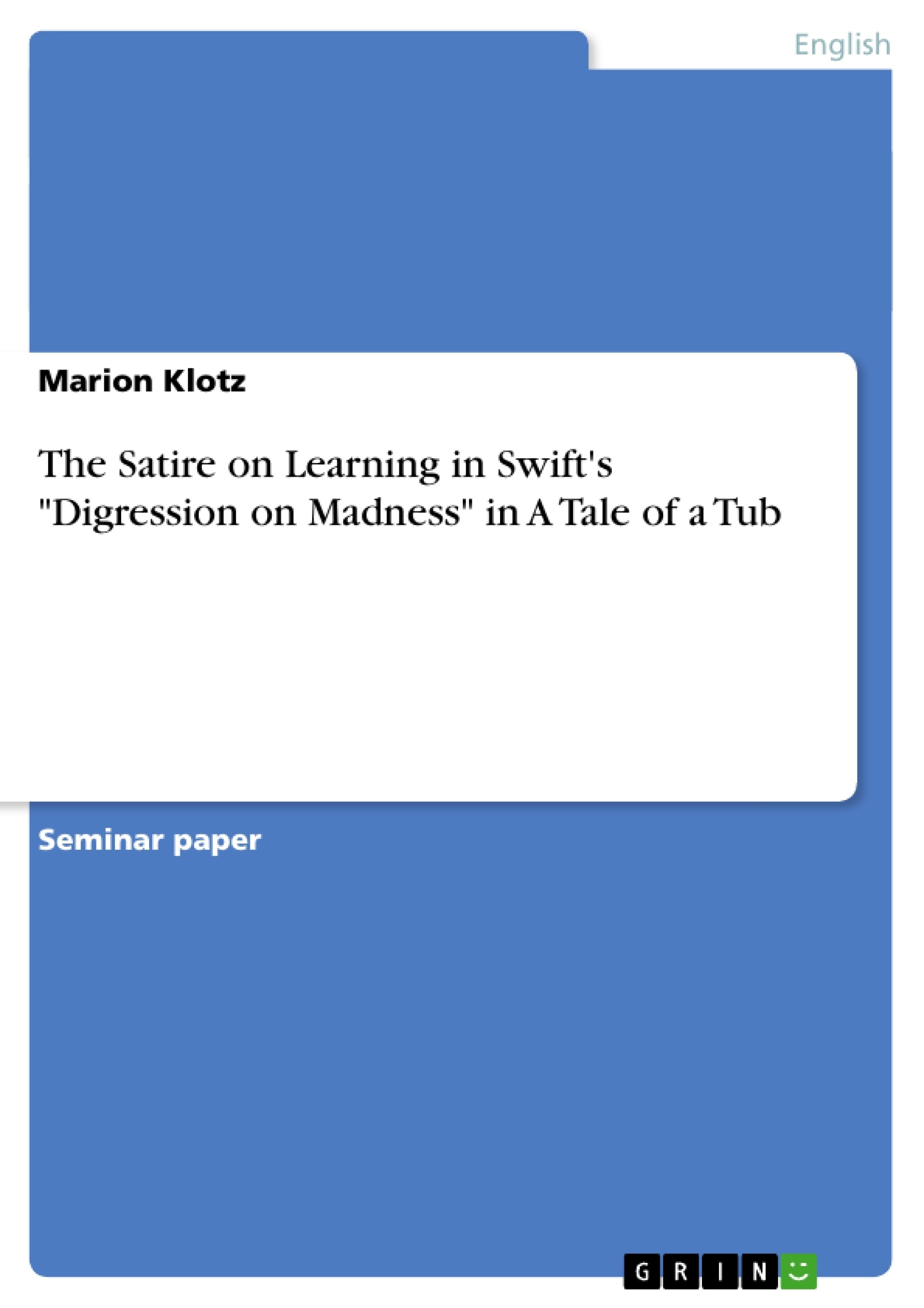"Satyr is a sort of Glass, wherein Beholders do generally discover everybody's face but their Own; which is the chief Reason for that kind Reception it meets in the World, and that so few are offended with it" (Swift, see Weiß 1).
When Swift wrote this, A Tale of a Tub had not been published yet. If it had been, he might not have characterised satire as something quite inoffensive to the individual reader: A Tale of a Tub made him the subject of massive criticism, mainly because of its supposed blasphemous nature. Not very surprisingly, however, this criticism was mainly issued by the men he had attacked in the digression, which were not about religion but learning (see Storkman xvi).
Similarly, although Swift had called his satire "On the Corruptions in Religion and Learning", and although at least two thirds of it actually deal with learning, most of the public interest has gone into the part of it concerning religion (see Storkman xiv).
In this paper, I therefore want to examine Swift's satire on learning in the tenth section of A Tale of a Tub, "A Digression on Madness". I will start with some introductory notes on satire, covering its history, its character and its techniques. In a second part I will then analyse "A Digression of Madness" first from a historical and then from a structural point of view. In the last chapter I will conclude the paper by summarising and discussing the main arguments of the first two chapters.
Inhaltsverzeichnis (Table of Contents)
- Introduction
- About Satire
- Its History
- Its Characteristics
- Its Techniques
- About "A Digression on Madness"
- Its Historical Background
- Ancients versus Moderns
- Swift and Epicureanism
- Its Structure
- Its Historical Background
- Conclusion
Zielsetzung und Themenschwerpunkte (Objectives and Key Themes)
This paper aims to analyze Jonathan Swift's satire on learning in the tenth section of A Tale of a Tub, "A Digression on Madness". It will examine the historical context of the digression, focusing on the "ancients versus moderns" debate and Swift's relationship to Epicureanism. Additionally, the paper will explore the structural elements of the digression and its satirical techniques.
- The history and characteristics of satire
- The historical background of "A Digression on Madness"
- Swift's satire on learning and its relation to the "ancients versus moderns" debate
- The structural features of "A Digression on Madness"
- The techniques employed in Swift's satire
Zusammenfassung der Kapitel (Chapter Summaries)
The introductory chapter provides a brief overview of satire as a literary genre, tracing its development from the seventeenth century to the twentieth century. It discusses the evolution of satire from a form of moral critique to a more sophisticated exploration of human folly and vice.
The second chapter delves into the historical context of "A Digression on Madness", examining the "ancients versus moderns" debate and Swift's relationship to Epicureanism. It highlights how Swift's satirical approach is shaped by the intellectual and cultural climate of his time.
Schlüsselwörter (Keywords)
The primary keywords and focus topics of this paper include satire, Jonathan Swift, A Tale of a Tub, "A Digression on Madness", ancients versus moderns, Epicureanism, and literary history. These terms reflect the paper's focus on Swift's satirical critique of learning and its relationship to the intellectual and cultural debates of his time.
Frequently Asked Questions
What is the focus of Swift's "Digression on Madness"?
Swift uses this section to satirize the "corruptions in learning," attacking modern scholarship and intellectual pretension rather than focusing solely on religion.
What was the "Ancients versus Moderns" debate?
It was an intellectual conflict in the late 17th century regarding whether classical knowledge (Ancients) or contemporary scientific and literary progress (Moderns) was superior.
How does Swift define satire?
Swift famously describes satire as a "glass" (mirror) where beholders discover everyone's face but their own, making it a powerful yet often unheeded social critique.
What role does Epicureanism play in the digression?
Swift engages with Epicurean philosophy to mock the materialist views of his time and to question the foundations of modern "mad" learning.
Why was "A Tale of a Tub" so controversial?
It was criticized for being blasphemous, though Swift argued his target was the corruption of religion and learning rather than faith itself.
- Citation du texte
- Marion Klotz (Auteur), 2004, The Satire on Learning in Swift's "Digression on Madness" in A Tale of a Tub, Munich, GRIN Verlag, https://www.grin.com/document/33539



